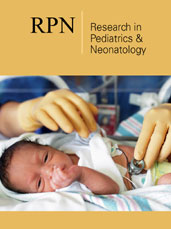- Submissions

Abstract
Research in Pediatrics & Neonatology
Cetirizine in Children with Coexisting Allergic Rhinitis and Asthma: A Randomized Trial
-
Open or CloseJingyang Li1, Guiying Ruan2, Hong Wang3, Linxiu Tu4, Xiaoqun Jin5, Yanming Lu6,Yaping Chen7, Yihui Yang8 and Yixiao Bao9*
1Department of Pediatric Respirology Medicine, Shanghai Jiao Tong University School of Medicine, Shanghai 200127, China
2Department of Paediatrics, Taizhou Women and Children Hospital affiliated to Wenzhou Medical University, China
3Department of Paediatrics, Civil Aviation General Hospital, China
4Department of Paediatrics, The People’s Hospital of Beilun District, Beilun Branch Hospital of The First Affiliated Hospital of Zhejiang University School of Medicine, China
5Department of Paediatrics, Shanghai Putuo District People’s Hospital, China
6Department of Paediatrics, Renji Hospital, School of Medicine, Shanghai Jiao Tong University, China
7Department of Paediatrics, Ningbo Women and Children’s Hospital, China
8Department of Otolaryngology, Ningbo Women and Children’s Hospital, China
9Department of Pediatrics, Shanghai Children’s Medical Center, Shanghai Jiao Tong University School of Medicine, China
*Corresponding author: Yixiao Bao, Department of Pediatrics, Shanghai Children’s Medical Center, Shanghai Jiao Tong University School of Medicine, Shanghai 200127, China
Submission: August 15, 2023; Published: September 07, 2023

ISSN : 2576-9200Volume7 Issue5
Abstract
Asthma and allergic rhinitis often coexist and it is suggested that the second-generation H1 antihistamines may be a promising treatment for patients with allergic rhinitis and asthma. This study was conducted to investigate the efficacy and safety of oral cetirizine in children with coexisting allergic rhinitis and asthma. 552 children, mean age 4.8 years, were randomized to receive daily oral cetirizine dihydrochloride drops plus inhaled corticosteroids (intervention group) or inhaled corticosteroids alone (control group) for 12 weeks. Allergic rhinitis symptoms, recent asthma control, the occurrence of acute asthma attacks, use of rescue medications, and adverse events were recorded. The proportions of subjects with good asthma control in the intervention group were 90.5%, 90.7% and 95.6% at Weeks 12, 16 and 24, respectively, which were significantly higher than the proportions in the control group (61.3%, 68.5% and 78.2%, respectively). The proportions of subjects with asthma attacks were significantly lower in the intervention group than the control group at Weeks 12 and 16. The use of rescue medications was significantly less in the intervention group than in the control group. Nasal symptoms improved in both groups and the improvements were significantly more pronounced in the intervention group. Treatment with cetirizine in addition to inhaled corticosteroids significantly improved asthma control and reduced nasal symptoms in children compared to inhaled corticosteroids alone.
Keywords:Allergic rhinitis; Asthma; Cetirizine; Children; Randomized trial
 a Creative Commons Attribution 4.0 International License. Based on a work at www.crimsonpublishers.com.
Best viewed in
a Creative Commons Attribution 4.0 International License. Based on a work at www.crimsonpublishers.com.
Best viewed in 







.jpg)






























 Editorial Board Registrations
Editorial Board Registrations Submit your Article
Submit your Article Refer a Friend
Refer a Friend Advertise With Us
Advertise With Us
.jpg)






.jpg)













.bmp)
.jpg)
.png)
.jpg)














.png)

.png)



.png)






